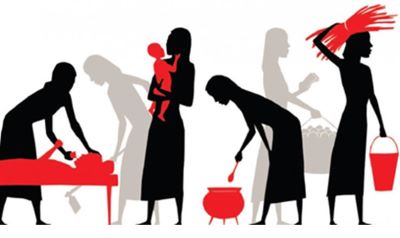Context
Women's participation in the labor market is a topic of growing importance, not just in India but globally. The economic growth of a nation is intricately linked with the level of involvement of women in its workforce. Despite the recognition of this correlation, India faces a challenge in significantly increasing women's participation in the economy. This article explores the various factors influencing women's participation in the labor market in India, with a focus on the role of patriarchy, societal norms, and the burden of unpaid domestic work.
The Role of Patriarchy
Patriarchy, deeply ingrained in Indian society, serves as a fundamental barrier to women's participation in the labor market. It perpetuates a social structure where men hold dominance over women in various spheres of life, including family, community, and society at large. This dominance manifests in the form of unequal distribution of assets, incomes, and wealth, as well as in the norms and values upheld by society. Despite advancements in education and economic growth, the patriarchal norms remain deeply entrenched, limiting women's opportunities for participation in the workforce.
Under the patriarchal system, women are predominantly assigned the role of homemakers, responsible for household chores and caregiving duties. Despite the importance of this work, it remains largely unpaid and invisible in economic policies and national discourse. The lack of recognition for this labor reinforces its inferior status, characterized by repetitive tasks, limited upward mobility, and absence of retirement benefits. As a result, a significant portion of the female labor force remains confined to low-productivity roles, perpetuating gender disparities in the labor market.
The Burden of Unpaid Domestic Work
One of the primary reasons for low women's participation in the labor market is the burden of unpaid domestic work that falls disproportionately on them. Women are expected to juggle household responsibilities alongside their professional aspirations, often leading to limited mobility and career options. The lack of infrastructure support, such as easy access to water and efficient cooking facilities, further exacerbates the burden of domestic work, constraining women's ability to pursue employment opportunities outside the home.
Addressing the issue of unpaid domestic work requires a multifaceted approach that involves both policy interventions and societal shifts. By redistributing household responsibilities more equitably between men and women, households can alleviate the strain on women and create a more conducive environment for their participation in the labor market. Moreover, investing in infrastructure and support services can further reduce the time and energy women spend on household chores, allowing them to channel their efforts towards educational and professional pursuits.
Exploitation of Women in the Labor Market
While increasing women's participation in the labor market is often touted as a solution to gender disparities, it is essential to recognize the prevalence of exploitation, particularly among domestic workers. Many women, especially those with higher education and professional qualifications, enter the workforce as domestic workers, facing precarious working conditions and minimal labor rights. Despite their contribution to the economy, domestic workers often lack basic protections such as minimum wages, social security, and limited working hours.
The exploitation of domestic workers underscores the need for comprehensive labor reforms and stronger enforcement of existing regulations. International labor standards, such as those outlined by the International Labour Organization, provide a framework for safeguarding the rights of domestic workers and ensuring their fair treatment in the labor market. However, the lack of ratification of these conventions in India reflects a broader failure to prioritize the welfare of vulnerable workers, including women engaged in domestic labor.
Promoting Gender Equality in the Labor Market
Achieving gender equality in the labor market requires more than just increasing women's participation; it necessitates a fundamental shift in societal attitudes and norms. Men must play a more active role in sharing household responsibilities, thereby reducing the burden on women and promoting a more equitable division of labor. Additionally, efforts to enhance women's access to education, skills training, and employment opportunities are crucial for empowering them to enter and thrive in the workforce.
By addressing the root causes of gender inequality, including patriarchy and the undervaluation of unpaid domestic work, India can create a more inclusive and dynamic labor market. Policy initiatives aimed at promoting women's economic empowerment and protecting their rights in the workplace are essential steps towards realizing this vision. Ultimately, achieving gender equality in the labor market is not just a matter of economic necessity but a fundamental human rights imperative that requires collective action and commitment from all segments of society.
Conclusion
In conclusion, women's participation in the labor market in India is influenced by a complex interplay of factors, including patriarchy, societal norms, and the burden of unpaid domestic work. While progress has been made in recent years, significant barriers remain to be addressed to ensure equal opportunities for women in the workforce. By challenging patriarchal structures, redistributing household responsibilities, and promoting policies that support women's economic empowerment, India can unlock the full potential of its female workforce and drive inclusive growth and development. Achieving gender equality in the labor market is not just an economic imperative but a moral imperative that requires concerted efforts from policymakers, employers, and society at large.
|
Probable Questions for UPSC Mains Exam Question 1: Discuss the challenges faced by women in accessing and participating in the labor market in India. ( 10 marks, 150 words) Question 2: Suggest measures to enhance women's economic empowerment and promote gender equality in the Indian labor market. (15 marks, 250 words) |
Source – The Hindu







